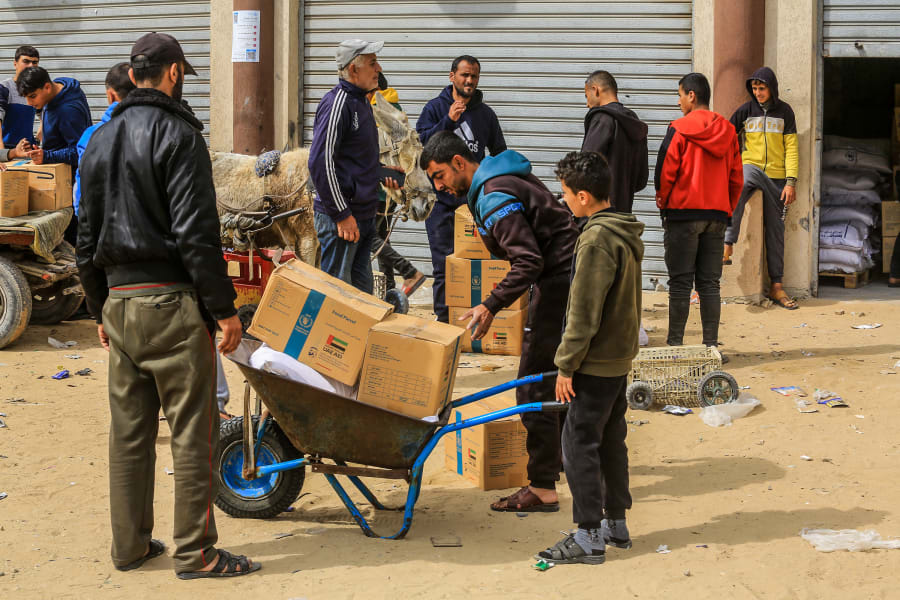Netanyahu declares resumption of humanitarian aid to Gaza despite strident cabinet opposition
Aid to be distributed under old mechanism by int'l aid groups, without oversight

Israeli Prime Minister Benjamin Netanyahu approved the resumption of humanitarian aid deliveries to the Gaza Strip under the former mechanism on Sunday, responding to mounting pressure from Europe and the United States, but going against strident opposition from several cabinet ministers.
According to the Prime Minister’s Office (PMO), the decision was made “on the recommendation of the IDF and based on the operational need to enable the expansion of the military operation to defeat Hamas.”
Israel suspended aid deliveries on March 1. According to Israeli media reports, IDF officials had recently been warning that large stockpiles of food accumulated in Gaza during the previous ceasefire would soon be depleted.
The decision to halt the deliveries was made without a cabinet vote and faced strong vocal opposition. Israeli officials had vowed not to renew the aid deliveries until a new mechanism was established to prevent Hamas from stealing the aid.
“This is a temporary measure for about a week until the completion of the establishment of the distribution centers, most of which will be in the southern Gaza Strip under IDF security control and will be operated by civilian American companies,” a senior official stated.
“Israel will allow a basic quantity of food to be brought in for the population in order to make certain that no starvation crisis develops in the Gaza Strip,” the PMO said. “Israel will act to deny Hamas’s ability to take control of the distribution of humanitarian assistance in order to ensure that the assistance does not reach the Hamas terrorists.”
However, there was no indication of Israeli moves to implement such a mechanism and COGAT, the IDF liaison unit for the Gaza Strip, announced that nine trucks would enter the enclave on Monday using the same process as in the past: Trucks would deliver the aid to warehouses of international aid groups, which would then distribute it to the population without direct oversight.
Despite the PMO’s declaration, sources in the security establishment admitted to Army Radio, “We cannot guarantee that the aid does not reach Hamas and is not looted, in the way it is being done now.”
According to media reports, most members of the cabinet opposed Netanyahu’s decision, with National Security Minister Itamar Ben Gvir demanding a vote, which was refused.
“The prime minister is making a grave mistake with this move, which doesn’t even have a majority. We must crush Hamas and not simultaneously give it oxygen,” Ben Gvir argued in a statement.
The decision was made amid mounting pressure by European countries – but also the U.S. – to resume aid deliveries before a humanitarian catastrophe broke out.
According to Israel's Kan News, Foreign Minister Gideon Sa’ar was among the lone voices to support the resumption of aid due to “the threats of sanctions - also from the United States.”
Sa’ar reported that Democratic and Republican representatives in the U.S. Congress had approached the Israeli ambassador to the U.S. to request the resumption of aid.
The Axios news outlet cited sources confirming that the Trump administration has been pressuring Israel to resume aid and accept the latest ceasefire proposal.
During his Middle East trip last week, U.S. President Donald Trump said, “We’re looking at Gaza. And we’re going to get that taken care of. A lot of people are starving.”
Trump’s special envoy, Steve Witkoff, told ABC’s “This Week” that “everyone is concerned about the humanitarian conditions in Gaza” while reiterating there was “no daylight” between Trump and Netanyahu.
“We do not want to see a humanitarian crisis, and we will not allow it to occur on President Trump’s watch,” Witkoff emphasized.
Meanwhile, Israeli opposition leaders largely held back on commenting on the decision itself. Most of the opposition favors a quick end to the war through a ceasefire agreement that would secure the release of all the remaining hostages, even at the price of leaving Hamas in control of the Gaza Strip.
One of the few leaders to comment was Benny Gantz, the chairman of National Unity party. “Once again, Netanyahu is hiding behind the IDF and the security establishment in decisions that undermine his coalition,” he wrote on 𝕏. “This is what a frightened leadership that is unable to stand behind its own decisions looks like, this is what national irresponsibility looks like in a time of war,” Gantz charged.
The decision was welcomed by Jake Wood, the executive director of the Gaza Humanitarian Foundation (GHF), a private group set to manage aid distribution beginning at the end of the month.
Wood welcomed the announcement as an “important interim step.”
“Through the GHF, we are building a secure, transparent system to deliver aid directly and effectively – without diversion or delay and in strict adherence to the humanitarian principles of humanity, neutrality, impartiality, and independence,” he added.

The All Israel News Staff is a team of journalists in Israel.
You might also like to read this:














